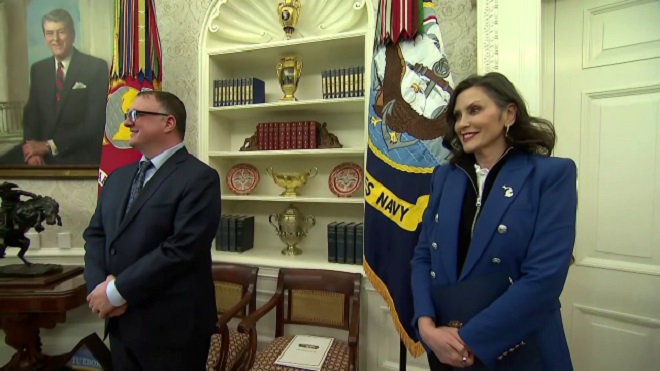Lansing, MI – In a notable shift from her previous, more vocal opposition to President Donald Trump, Michigan Governor Gretchen Whitmer delivered a speech on Wednesday that emphasized points of agreement between the two on economic policy. The address, framed as a “blueprint for success,” came just hours before her scheduled one-on-one meeting with the president, signaling a more diplomatic approach as Whitmer continues to navigate the delicate balance between partisan interests and her state’s economic needs.
Whitmer’s speech, titled “Build, America, Build,” called for bipartisan cooperation to revitalize American manufacturing. While offering some soft criticism of Trump’s policies, Whitmer emphasized shared priorities, particularly the need to bolster domestic production. “I understand the motivation behind the tariffs,” Whitmer said, acknowledging the president’s economic agenda. “And I can tell you, here’s where President Trump and I do agree. We do need to make more stuff in America.”
However, Whitmer also struck a cautionary note regarding Trump’s tariff strategy. While she expressed understanding of the rationale behind tariffs, she warned against using them indiscriminately, stating, “You can’t just pull out the tariff hammer to swing at every problem without a clear defined end-goal.” This nuanced stance reflects Whitmer’s preference for a more strategic and targeted approach to tariffs, particularly in industries crucial to Michigan’s economy, such as the auto industry.
Her speech came ahead of her second one-on-one meeting with Trump in less than a month. In addition to the meeting, Whitmer was scheduled to attend a dinner at the White House, where she would sit alongside the president. The meeting follows Trump’s announcement of new tariffs that are expected to disproportionately impact Michigan, a state whose economy is deeply entwined with trade relations, particularly with Canada, Mexico, and other global partners.
Once one of Trump’s most outspoken critics during his first term, Whitmer has adopted a more measured tone toward the president since his reelection. Over the past several months, she has delivered multiple speeches calling for finding “common ground” and engaging in productive dialogue with the White House, even when it means negotiating on contentious issues.
“If you’re not at the table, you’re on the menu,” Whitmer said during a discussion following her speech. “My oath to the people of Michigan is to continue to show up, even when it means I’m going to get my lunch handed to me.”
This approach contrasts sharply with that of other Democratic governors, many of whom have remained vocal in their opposition to Trump. Governors such as Illinois’ JB Pritzker and California’s Gavin Newsom have publicly criticized the president’s tariff policies, with Pritzker calling the tariffs a threat to American manufacturing and Newsom urging international partners to spare California from retaliatory measures.
Whitmer, however, faces a more complex political landscape. Michigan, which went for Trump in both the 2016 and 2020 elections, remains a battleground state, and Whitmer’s more moderate approach reflects her need to engage with the president, even if it means setting aside some partisan differences.
In her remarks, Whitmer emphasized the importance of strategic reindustrialization, calling for a long-term, bipartisan commitment to rebuilding American manufacturing infrastructure. “There’s not a shortcut here,” she said. “Strategic reindustrialization must be a bipartisan project that spans multiple presidential administrations.”
Despite the shift in tone, Whitmer made it clear that she was not signaling a run for president in 2028. “This year and in the years to come — no matter who’s in the White House — we need to be betting on American workers,” she stated, adding, “We need to bring chip manufacturers back home. Let’s dominate the seas and the skies and the roads. Let’s innovate and let’s build.”
While Whitmer’s approach has sparked mixed reactions, with some praising her pragmatism and others criticizing her moderation, her speech left little doubt that she is positioning herself as a leader who prioritizes Michigan’s economic interests over partisan politics. Whether her actions will quiet speculation about a 2028 presidential run remains to be seen, but for now, Whitmer continues to forge a path that balances the needs of her state with the complexities of national politics.












